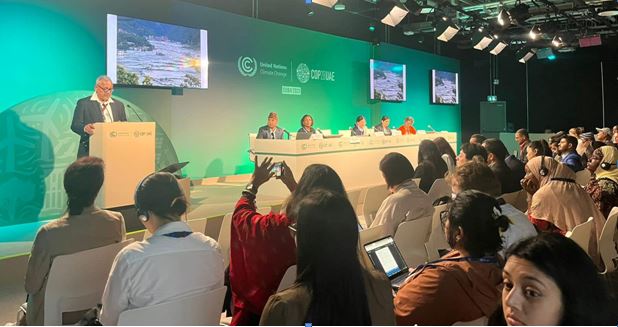DUBAI: Civil society leaders from Nepal have called for compensation to least developed countries like Nepal for the loss and damage they have suffered due to climate change.
Addressing an event on the sidelines of the 28th Conference of Parties (COP28) in Dubai, Dr Arjun Karki, global coordinator of LDC Watch, said that climate change has unleashed unprecedented disruptions, striking the upstream and downstream communities of Nepal with alarming intensity.
“The recent Melamchi and Kagbeni floods in Nepal are examples of disasters that severely threatened the communities living along the river corridors, causing loss of lives and livelihoods to the local communities,” said Dr Karki adding, “The downstream communities in Nepal are equally vulnerable, if not more to the devastating impacts of climate change. Extreme weather events and shifting rainfall patterns pose significant challenges to their survival. Terai region in Nepal is facing droughts, longer in duration and intensity, severely threatening food and water security in the region.”
‘Demand for Reparation’
Dr Karki also demanded reparations from rich countries. “Reparations not merely in the form of financial transactions but as a moral imperative. It is about acknowledging historical responsibility and recognizing the fundamental right of affected communities to live in a stable and sustainable environment. Let us amplify the voices of those who are disproportionately affected, including women, marginalized groups, and indigenous people, and ensure that our collective efforts translate into meaningful action,” he added.
Laxmi Gurung, a panelist, recounted the distressing flash flood in Kagbeni (a rural municipality in the Mustang district, Nepal), detailing significant economic and non-economic losses, including damage to identity and culture. She passionately appealed for financial support to rebuild the village and safeguard its cultural heritage.
Apsara Lamichhane articulated the challenges faced by agriculture-dependent community in Sindhupalchok, Nepal, emphasizing non-economic losses that defy quantification. Her call for compensation from developed countries resonated with the urgent need for acknowledgment.
Ujjwal Amatya from Mission East Nepal presented research data from marginalized areas in Nepal, revealing significant economic losses per household. His presentation underscored the need for climate resilient agriculture, economic restoration, and local advocacy.
Amidst unprecedented climate challenges, the unified voices from the Global South resounded with a collective plea for immediate and substantial global action. Their emphasis on financial support, adaptation measures, and justice for communities disproportionately affected by loss and damage encapsulated the urgency of the situation.
The panel discussion on “Loss and Damage: Realities of the Global South” was organised by LDC Watch, KIRDARC, Digo Bikash Institute (DBI), and Asian Peoples’ Movement on Debt and Development (APMDD).

